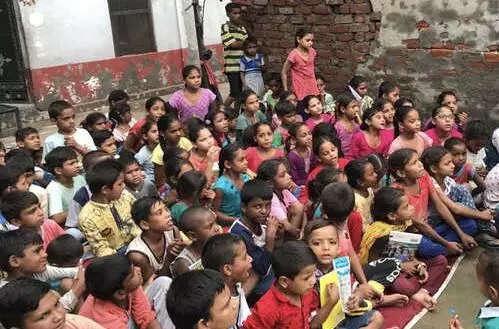`Fair is not always lovely’: India 67% children aged between 6-59 months suffer from anemia
Children may suffer from multiple problems due to anemia, including developmental challenges and immune system complications
By Neelambaran A
`Fair is not always lovely’: India 67% children aged between 6-59 months suffer from anemia
Hyderabad: Anemia is a serious health condition characterized by insufficient healthy red blood cells to transport oxygen effectively.
Anemia is considered a public health problem in India with the National Family Health Survey (NFHS-5) revealing that 67% of the children aged between 6-59 months are affected by anemia.
Children may suffer from multiple problems due to anemia, including developmental challenges and immune system complications.
Causes for anemia in children
Children can suffer from anemia due to multiple reasons, with iron deficiency, poor absorption of dietary iron, and blood loss being the key reasons.
Dr. Jesal Sheth, Senior Consultant-Pediatrics, Fortis Hospital, Mulund said, “Iron-deficiency anemia (IDA) stands as the most prevalent form in children worldwide. The most common cause of anemia in children is iron deficiency, but it can also result from vitamin deficiencies, blood loss due to worms, genetic disorders, and chronic diseases.”.
Parasitic infections, particularly intestinal worms, can cause blood loss leading to anemia. Additionally, children with chronic kidney disease or cancer may develop anemia as a secondary condition.
Physical and Developmental Impacts
The effects of anemia on children are far-reaching and can significantly impact their development. The immediate physical symptoms include persistent fatigue and weakness, shortness of breath, especially during physical activity, pale skin and mucous membranes, dizziness and heart palpitations, and leg swelling in severe cases
Long-term problems can be severe in growing children with chronic anemia leading to delayed physical growth, impaired cognitive development, and lower academic performance. These effects can persist even after the anemia is treated and could affect future opportunities and quality of life.
Immune System Complications
“Iron is crucial for immune cell function, so anemia can weaken a child's immunity, making them more susceptible to recurrent infections of many types”, said Dr. Jesal Sheth.
The children can suffer from Increased susceptibility to bacterial and viral infections, longer recovery time, high possibility of respiratory tract infections, and increased risk of gastrointestinal infections.
Diagnostic Approach and Monitoring
Early detection is crucial for effective treatment. Healthcare providers typically recommend regular screening through hemogram tests, particularly for at-risk children.
“If children appear pale, parents should get a blood test called a hemogram done to check if their Hemoglobin levels are below the appropriate range for their age. The normal Hemoglobin range is up to 10.5 - 13.5 grams per deciliter (g/dL) for infants aged 11-12 months, 11.5 - 13.5 g/dL for children (1-10 years), and 12 - 16 g/dL (similar to adults) for adolescents (10 years and above)”, Dr. Jesal Seth explained.
Children should be with iron supplements and iron-rich foods such as spinach, red meat, and beans. Vitamin B12 deficiency. Vegetarian children with poor dietary intake or absorption issues can be treated with vitamin B12 supplements and dietary adjustments.
Treatments suggested
For children with iron-deficiency anemia, oral iron supplementation in appropriate doses, and dietary modifications to include iron-rich foods like lean red meat, spinach, legumes, fortified cereals, and Vitamin C-rich foods to enhance iron absorption are essential.
Other anemic cases can be treated with Vitamin B12 supplementation for deficiency cases, folic acid supplements when indicated, treatment of underlying conditions causing anemia, specialized care for genetic disorders